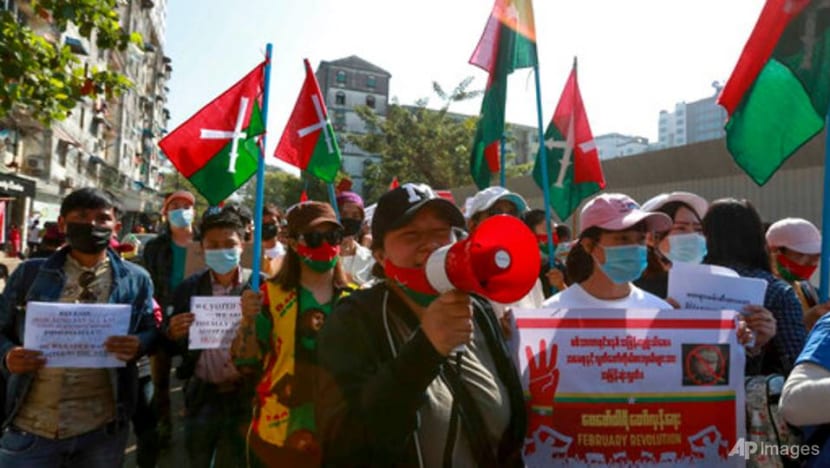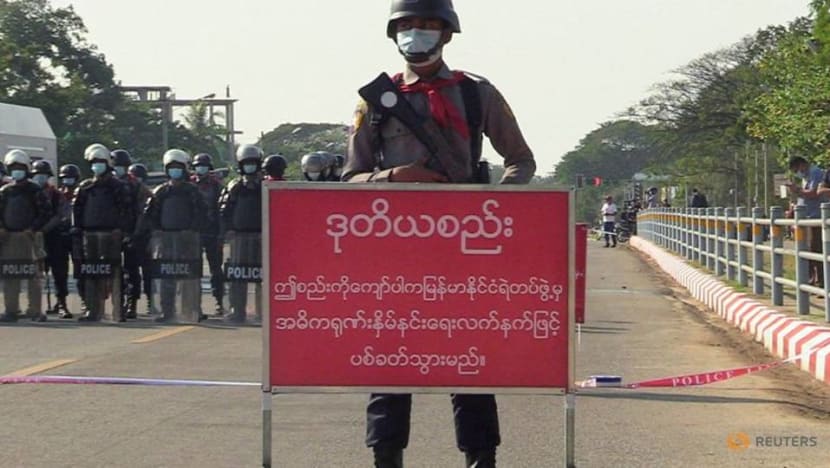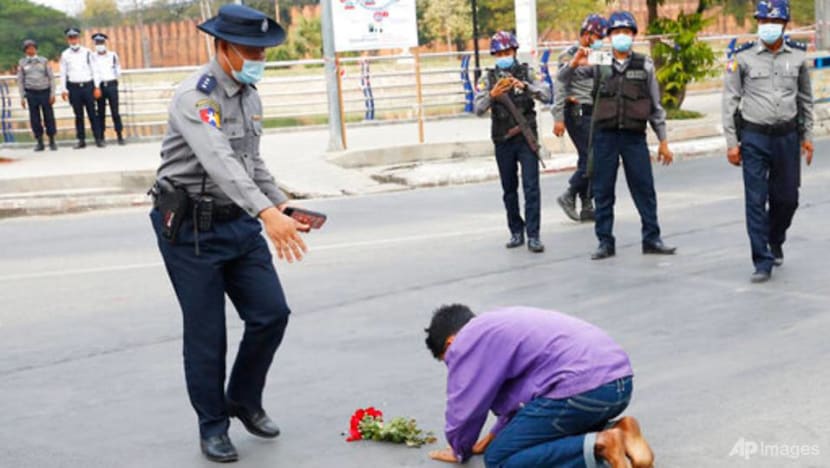commentary Commentary
Commentary: Understanding its history of resistance rather than sanctions can help Myanmar now
Whichever factors flipped the country’s political fortunes overnight, a revival of military dictatorship is materialising fast for the people of Myanmar, says Van Tran.

Myanmar
ITHACA, New York: Few things capture the eerie nature of Myanmar’s recent political saga better than a Burmese physical education teacher’s rise to global internet fame last week, when her morning exercise video accidentally included some raw footage of an unfolding coup in the background.
A formerly isolated military dictatorship that has reformed and opened up drastically since 2010, Myanmar never completely got rid of its junta legacy.
In the early morning hours of Feb 1, the Southeast Asian country’s military - the Tatmadaw, as it is officially known in the country - decided to reclaim its status as Myanmar’s sole centre of political power, arresting dozens of key civilian politicians and activists, declaring a state of emergency, and transferring power to its commander-in-chief, Min Aung Hlaing.
WHY DID IT HAPPEN?
Many observers of the country’s political history have offered explanations for why the coup occurred at this moment.
Some highlighted the Tatmadaw’s insecurity over its future status, since the popularly-elected civilian government led by Aung San Suu Kyi has attempted to reduce the military’s political authority.
Others emphasise the Tatmadaw’s demand for respect, which the ruling party - the National League for Democracy - has outright denied by refusing to investigate the military’s claim of voter fraud in the November 2020 general election.
Whichever factors flipped the switch, a revival of military dictatorship is materialising fast for the people of Myanmar.
READ: Commentary: A crackdown in Myanmar could spark a humanitarian crisis
With surgical steps straight out of a coup textbook, the Tatmadaw has done the following in just one week: Conducted night arrests of major opposition political figures across the country, assembled a State Administrative Council with Min Aung Hlaing at its helm, filled the majority of ministerial posts, filed charges against the de facto civilian leader Aung San Suu Kyi and de jure President Win Myint, curtailed freedom of expression on social media, repeatedly cut off phone and internet connections, and imposed martial law across major cities.
In response, Burmese communities in Myanmar and abroad have refused to stay silent. Many have taken to social media platforms not only to express their disbelief, fear, and anger, but also to mobilise for collective non-violent resistance.
REVERSAL OF FORTUNES
Although the country’s liberalisation in the past 10 years has stagnated at times, and systematically excluded many ethnic and religious minority groups, it has nonetheless brought unprecedented political rights and economic opportunities to a large swath of the population.

Compared to the pre-2010 military dictatorship, under a largely civilian-run system, the majority of people in Myanmar have enjoyed expanded freedoms of expression and assembly, the right to vote and political representation, and increasing business and education opportunities, together with unrestricted international exposure and internet access.
The coup, to them, means regressing to a dark past where none of these existed - and turning their lives upside down.
However, despite widespread despair, calls for anti-coup resistance have quickly gone viral on social media, circumventing multiple internet blockages. A civil disobedience movement, urging civil servants to stop working, has attracted hundreds of thousands of followers on its Facebook page.
READ: Commentary: Myanmar coup poses first foreign policy test for Biden on Southeast Asia
Other prominent activists took to Facebook to call for peaceful street protests across the country. Millions of internet users also encouraged their contacts to heed civil society leaders’ guidance for nonviolent resistance and shared safety and communication tips.
Remarkably, this is not their first time acting collectively to oppose military rulers.
COLLECTIVE ACTION
Resilient struggle against repressive dictators has been a hallmark of Burmese society. During the nearly 50 years of military rule between 1962 and 2010, popular anti-regime protest movements and uprisings sprang up in every decade in urban areas throughout the country.
Despite violent crackdowns, thousands of grassroots activists and their supporters, staged historic student protests, labour protests, and monk-led boycotts that cohered under a nationwide pro-democracy movement.
Older activist generations would continue to inspire and pass down lessons on nonviolent strategies to new movement leaders, who then carried the movement forward throughout the repressive years.
This time is not different. What we have recently witnessed and might continue to see are innovations in non-violent resistance tactics.
READ: Commentary: Myanmar military never had any intention of giving up power
As civil society groups in Myanmar have significantly expanded and integrated into global activism networks in the past decade, they are well-equipped with various lessons from home and abroad in order to launch large-scale and resilient mobilisations in this digital age.
While the Tatmadaw might further restrict venues for mass mobilisation, as history has shown, Myanmar’s pro-democracy campaigns are likely to evolve even under severe repression.
WILL SANCTIONS HELP?
To fight for the political rights of people in Myanmar, it is critical that the international community prioritises providing direct support for anti-coup resistance efforts, instead of zeroing in on economic sanctions.

Various forms of foreign support toward domestic activism have contributed to the growth of the pre-2010 pro-democracy movement.
Radio stations such as BBC, Voice of America, and Radio Free Asia even played a critical role in helping Burmese activists broadcast their campaigns, transforming bystanders into informed participants as a result.
The use of sanctions has not and likely won’t propel Myanmar’s military dictators toward democracy.
READ: Commentary: ASEAN can do better on Myanmar this time
Instead, it has been ordinary people who fall victim to their economic impact. Myanmar’s neighbours in Asia are sure to continue prioritising economic engagement, regardless of Myanmar’s domestic political circumstances.
The West will likely fail to reverse the current political trends through sanctions and will only diminish its importance and create a vacuum to be filled by Myanmar’s willing economic partners.
Learning from what has and has not worked in the past, the international community will stand a better chance at helping Myanmar’s residents reclaim their rights and freedoms.
Van Tran is Researcher on social movements in Myanmar and a candidate for a PhD in Political Science from Cornell University. This commentary first appeared in the Brookings Institution’s blog Order from Chaos.












